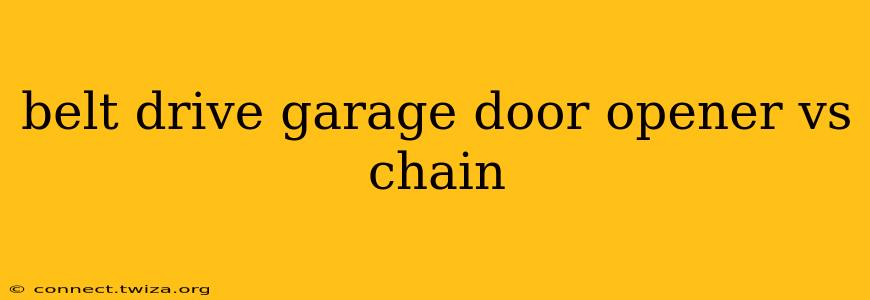Choosing a new garage door opener can feel overwhelming. Two of the most popular drive types are belt drive and chain drive. Both get the job done, but they offer distinct advantages and disadvantages. This comprehensive guide will help you understand the key differences between belt drive and chain drive garage door openers to make an informed decision for your home.
What is a Belt Drive Garage Door Opener?
Belt drive garage door openers use a strong, durable rubber belt to lift and lower your garage door. This belt is typically made of polyurethane or reinforced rubber, offering a quieter and smoother operation compared to chain drives. The quieter operation is a significant selling point for many homeowners.
What is a Chain Drive Garage Door Opener?
Chain drive garage door openers utilize a metal chain to connect the motor to the garage door trolley. These openers are generally more affordable than belt drive options. However, the metal chain’s movement creates a noticeable, often loud, clanking sound.
What are the Pros and Cons of Each Type?
Let's break down the advantages and disadvantages of each type of garage door opener to help you decide which best suits your needs:
Belt Drive Garage Door Opener: Pros and Cons
Pros:
- Quieter Operation: The rubber belt significantly reduces noise compared to a chain drive. This is a major benefit for those with bedrooms or living spaces near the garage.
- Smoother Operation: The belt provides a smoother, more controlled movement, leading to less wear and tear on the garage door components.
- Longer Lifespan: Many manufacturers claim longer lifespans for belt drive systems due to reduced wear and tear.
- Improved Durability: The belts are generally more resistant to stretching and damage compared to chains.
Cons:
- Higher Cost: Belt drive openers typically have a higher initial purchase price compared to chain drive openers.
- Potential for Belt Slippage: While rare with high-quality belts, slippage can occur under heavy loads or if the belt becomes worn.
- Less Powerful: While perfectly adequate for most standard garage doors, they might not be as powerful as some high-performance chain drive openers.
Chain Drive Garage Door Opener: Pros and Cons
Pros:
- Lower Cost: Chain drive openers are generally more affordable upfront.
- More Powerful: Chain drives often offer more pulling power, making them suitable for heavier garage doors.
- Simple and Reliable: The simple mechanism is less prone to complex failures than more sophisticated belt drives.
Cons:
- Noisy Operation: The metal chain creates a significant amount of noise during operation. This can be a major drawback for those sensitive to noise.
- Rougher Operation: The chain's movement can be jerky and less smooth than a belt drive, potentially causing more wear and tear on the door and tracks over time.
- Shorter Lifespan: Compared to belt drives, chain drives generally have a shorter operational lifespan due to increased wear and tear.
Which is Quieter, Belt Drive or Chain Drive?
Belt drive garage door openers are significantly quieter than chain drive openers. The rubber belt absorbs much of the noise generated during operation, resulting in a more peaceful garage environment.
Which is More Durable, Belt Drive or Chain Drive?
While both have their strengths, belt drives are generally considered more durable in the long run. The rubber belt is less susceptible to wear and tear than the metal chain, potentially extending the lifespan of the opener.
Which Type of Garage Door Opener is Best for Heavier Doors?
Chain drive openers typically have more pulling power and are often better suited for heavier garage doors. If your garage door is particularly heavy or oversized, a chain drive might be a more reliable option.
Which is Better for My Garage?
The best type of garage door opener for your garage depends on your priorities. If noise reduction and smooth operation are paramount, a belt drive is the better choice. If budget is a major concern and you have a standard-weight door, a chain drive could be sufficient. Consider factors such as your budget, the weight of your garage door, and your sensitivity to noise when making your decision.
